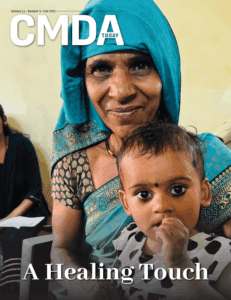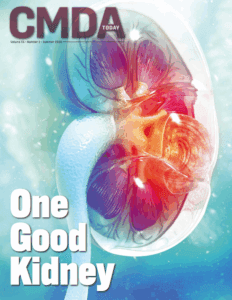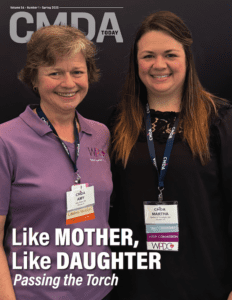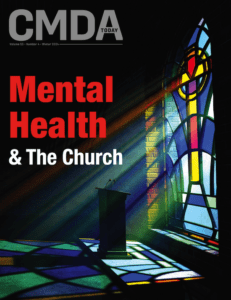Advocating the Justice Priorities of Jesus
In 2021 the CMDA Board of Trustees assigned nine strategic initiatives to the staff of CMDA for completion over a three-year period. One of the two initiatives placed under the advocacy was to align its advocacy with policies where Jesus has the greatest concern.
by Jeffrey J. Barrows, DO, MA (Ethics)
In January 2021, as part of its ongoing strategic plan, the CMDA Board of Trustees assigned nine strategic initiatives to the staff of CMDA for completion over a three-year period. One of the two initiatives placed under the advocacy department was the assignment for CMDA to align its advocacy with policies where Jesus has the greatest concern. This article will give a defense for Christian advocacy in the public square, then provide an overview of the process we used to attempt to discern the policy priorities of Jesus and conclude with a summary of our updated advocacy issues moving forward.
Christian Advocacy in the Public Square
Many Christians are not convinced that a Christian organization like CMDA should use precious financial resources to advocate for biblical values within the public square. Prior to examining this question further, let me provide my definition of advocacy. I define advocacy broadly to include any action that supports policies in alignment with biblical principles as well as actions that oppose policies that violate biblical principles. These actions may be engaged at society's individual, community or governmental levels. This definition expands advocacy far beyond the traditional work of legislative advocacy, or advocacy surrounding the writing and passing of laws at the state and federal levels.
Scriptural support for these advocacy actions is found in both Old and New Testament verses dealing with the concept of justice. Take, for example, the following Old Testament verse describing God’s actions:
“He executes justice for the fatherless and the widow, and loves the sojourner, giving him food and clothing” (Deuteronomy 10:18, ESV).
God here is described as undertaking an action to address injustice affecting the orphan and widow. That action is spelled out for the sojourner but is left unspoken regarding the orphan and widow. An ongoing theme that emerges through the rest of the Old Testament is God’s repeated demand for justice for the oppressed. The following verse illustrates that concern:
“O Lord, you hear the desire of the afflicted; you will strengthen their heart; you will incline your ear to do justice to the fatherless and the oppressed, so that man who is of the earth may strike terror no more” (Psalm 10:17-18, ESV).
Notice that the purpose of God hearing the desire of the afflicted is to do justice to the fatherless and the oppressed. Justice is achieved through action. Beyond God’s direct involvement in executing justice for the oppressed, God also commands His followers to engage in actions that address injustice:
“Give justice to the weak and the fatherless; maintain the right of the afflicted and the destitute. Rescue the weak and the needy; deliver them from the hand of the wicked” (Psalm 82:3-4, ESV, emphasis added).
The Hebrew word translated as “maintain the right” in the English Standard Version is another call to action that is translated simply as “do justice” in the King James Version. One modern tool to maintain the afflicted’s rights is advocating for laws that promote justice. Other actions certainly include direct care for the oppressed, but they should also include advocating for justice within the political and public arenas. Public advocacy aligns with the commands of Jesus found in Matthew 5:13-16:
“You are the salt of the earth, but if salt has lost its taste, how shall its saltiness be restored? It is no longer good for anything except to be thrown out and trampled under people’s feet. You are the light of the world. A city set on a hill cannot be hidden. Nor do people light a lamp and put it under a basket, but on a stand, and it gives light to all in the house. In the same way, let your light shine before others, so that they may see your good works and give glory to your Father who is in heaven” (ESV).
In summary, a biblical interpretation of advocacy entails a broad spectrum of actions to achieve justice for those suffering oppression and injustice. While those actions should go beyond legislative or political advocacy, they certainly don’t exclude it. Often, it is only through legislative advocacy that ongoing systemic injustice can be corrected. A current example is ongoing efforts of CMDA to reverse the legalization of the destruction of unborn life occurring in numerous states across the country.
Development and Piloting of the Advocacy Assessment Framework
Because several public policy issues relating to healthcare being raised today were not even mentioned in Scripture (e.g., organ transplantation), attempting to discern the policy priorities of Jesus necessitated the development of a framework. Based on Scripture, this framework would allow the evaluation and prioritization of public policy issues under discussion in today’s public square. The development of this framework was undertaken by the following steps:
- A member of CMDA’s Ethics Committee cataloged all the gospel references detailing the actions of Jesus during His three-year ministry on earth. This document contained over 240 different gospel references covering 39 different actions of Jesus.
- I then took this document and condensed the 39 actions of Jesus into nine different themes:
- Aligning with God’s kingdom and will
- Proclaiming the gospel
- Calling for repentance
- Teaching biblical principles
- Prioritizing eternity over immediate needs
- Expressing love and care toward fellow believers
- Expressing love for neighbors, sinners and enemies
- Helping the poor, burdened and needy
- Healing the sick
- To create an objective value for each of the nine themes, each one was assigned five questions to clarify the degree to which an advocacy issue aligned with that biblical theme, allowing each theme to receive a score of one to five for each advocacy issue. These scores are meant to give a general sense of prioritization among the various issues rather than establish a definitive decision regarding which advocacy issue would be addressed.
- With further review by members of the CMDA Ethics Committee, the nine biblical themes were edited to include adherence to the two great commandments and the mitigation of oppression.
- Members of the Ethics Committee along with the CMDA advocacy team then piloted this new framework by evaluating the following advocacy issues:
- Abortion
- Assisted suicide
- Conscience freedoms
- Gender transition in minors
- Saving girls’ sports
- Advocacy against medical marijuana
- Advocacy against recreational marijuana
- Advocacy regarding opioid addiction
The piloting of this assessment framework established its usefulness because it caused the participants to evaluate the advocacy issue through the lens of scriptural and biblical principles that illuminated potential forms of advocacy on that issue that would better align with biblical principles. Take, for example, the advocacy issue of abortion. Most would highly score advocacy as in alignment with God’s kingdom and will in the preservation of life. However, political advocacy on abortion did not score as highly when it came to the biblical principles of expressing love to sinners and neighbors or helping the poor and needy. That recognition has helped us expand our advocacy efforts to include advocating for pregnancy resource centers and other ministries devoted to helping women with unwanted pregnancies.
Utilization of the Assessment Framework for Evaluation of Potential Advocacy Issues
An additional aspect of the Board of Trustees strategic initiative included this question: How can we broaden our advocacy to include population health issues, social injustice, inequality and health disparities as a reflection of Jesus’ love of all people?
With that specific question in mind, the following advocacy issues were added, and the internal CMDA advocacy team was asked to score the following potential advocacy issues using the newly developed assessment framework:
- Access to healthcare
- Human trafficking
- Foster care/adoption
- Refugee assistance
- Care for vulnerable pregnant women
- Mental health crisis
Placing all the issues together, below are the rankings and average scores from the internal CMDA Advocacy team:
| Rank | Average Score | |
| Abortion | 67 | |
| Human trafficking | 60 | |
| Conscience freedoms | 17 | |
| Assisted suicide | 83 | |
| Foster care/adoption | 80 | |
| Refugee assistance | 20 | |
| Assisting vulnerable pregnant women | 40 | |
| Healthcare acces | 00 | |
| Opioid addiction | 00 |
| Gender transition in minors | 00 |
| Protecting girls’ sports | 40 |
| Recreational marijuana | 33 |
| Medical marijuana | 40 |
Conclusion
After initial piloting of the assessment framework and upon further consultation with the CMDA Ethics Committee, the decision was made to add to the framework an assessment of the unique position of CMDA to address a particular advocacy issue. This brought the total of themes within the framework to 10 with the final list below:
- Alignment with God’s kingdom, will and love
- Ability to proclaim the gospel
- Ability to call for repentance
- Ability to teach biblical principles
- The issue prioritizes eternity over earthly needs
- The expression of love and care toward fellow believers
- The expression of love for neighbors, sinners and enemies
- Does the issue help the poor, burdened and oppressed
- Does the issue facilitate healing the sick
- The unique position of CMDA to address the issue in comparison to other groups
Moving forward, the internal advocacy department of CMDA will complete the final aspect of this Board of Trustees initiative, which is to:
“Broaden the scope of our advocacy through identifying and prioritizing the issues of biblical concern that impact health, strengthening our advocacy in those areas, and aligning our advocacy and our practical applications.”
Our advocacy efforts will be broadened to include the additional six advocacy issues listed above, recognizing that several of these issues require a form of advocacy that is not legislative or political. For example, human trafficking, the second-ranking advocacy issue, has existing statutes at both the federal and state level. Non-political forms of advocacy moving forward may include emphasizing the ongoing education of our members to recognize victims of human trafficking as they present within the healthcare setting, assisting our members in the development of response protocols for trafficking victims in healthcare settings and encouraging our members to provide healthcare assistance to existing human trafficking rehabilitation facilities.
These changes will slowly roll out over the next several months as the CMDA advocacy team adjusts the priority of our advocacy efforts to come into alignment with the above ranking of our advocacy issues. Finally, our list of advocacy issues will likely grow as our culture continues to change and move away from a biblical worldview.
Get Involved
Do you feel called to get involved in CMDA’s advocacy work as we broaden our advocacy work to further broaden our efforts to align with the areas of Jesus’ greatest concern? You can join our efforts in your individual community, your state and your country as we advocate for your rights and the rights of your patients when it comes to issues like assisted suicide, right of conscience, abortion, transgenderism and others. To get involved, contact CMDA’s Advocacy and Communications Team at [email protected].
About the Author
Dr. Jeffrey Barrows serves as Senior Vice President of Bioethics and Public Policy for Christian Medical & Dental Associations. Dr. Barrows is an obstetrician/gynecologist, author, educator, medical ethicist and speaker. He completed his medical degree at the Des Moines College of Osteopathic Medicine and Surgery in 1978 and his residency training in obstetrics and gynecology at Doctors Hospital in Columbus, Ohio. In 2006, he completed a master’s in bioethics from Trinity International University in Chicago, Illinois. Dr. Barrows was called out of full-time practice in 1999 to help administrate Christian Medical & Dental Associations’ Medical Education International (MEI) ministry. He served as the director of MEI from 2002 to 2005 before transitioning into the fight against human trafficking. He has dedicated 15 years of his career to fighting against human trafficking within the intersection of trafficking and healthcare, as well as the rehabilitation of survivors of child sex trafficking. Dr. Barrows has trained healthcare professionals on how to recognize and assist victims of trafficking within healthcare and has published numerous book chapters and articles. He has testified to the Ohio legislature on numerous anti-trafficking bills and is a speaker on human trafficking to the media, the church and in other venues. In 2008, Dr. Barrows founded Gracehaven, an organization assisting victims of domestic minor sex trafficking in Ohio. In 2014, he served as a member of the Technical Working Group on health and human trafficking under the U.S. Department of Health and Human Services’ Administration for Children and Families. In addition, he is a founding board member of HEALTrafficking. In 2020, Dr. Barrows published a novel entitled Finding Freedom that realistically portrays child sex trafficking in the U.S.





